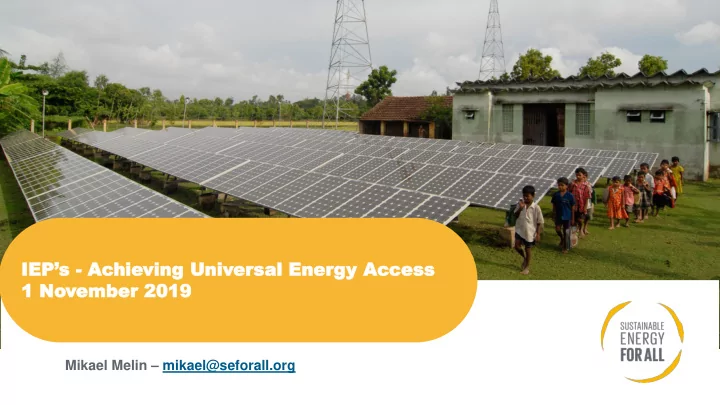

IEP’s - Ac Achie hieving ving Univ Univer ersa sal l Ene Energy y Acc Acces ess 1 1 No Novembe ember r 201 2019 Mikael Melin – mikael@seforall.org
SUSTAINABLE ENERGY FOR ALL (SEforALL) Sustainable Energy for All is an International Organization working with leaders in government, the private sector and PROJECT TITLE civil society to drive further, faster action toward Subtitle achievement of Sustainable Development Goal 7, which calls for universal access to sustainable energy by 2030
Background – 840 million people without access
Background
Background
Introduction to IEP – Integrated Electrification Pathways
What is an IEP? A set of inclusive planning approaches and policy measures that support using grid, mini- grid and off-grid technologies to provide electricity and the associated energy services necessary to meet human needs and contribute to sustainable development .
IEP Guiding Principles (1) Recognize electricity access as essential for achieving other development goals • Power the development vision of the country’s future • Develop a framework for input and close coordination with Ministries of Finance, Infrastructure, Health, Education, Rural Development, Gender/Women Consider all sustainable technologies and delivery models available • Grid extension/densification, mini-grid and off-grid/stand-alone technologies where appropriate • Appropriate data and Geo-spatial modelling very important at this stage to identify appropriate solutions against tier of service required and affordability constraints
IEP Guiding Principles (2) Establish high-level political support for coordinated government planning • Commitment at the highest political level builds confidence in investors, donors and private sector Develop policy measures that encourage private sector investment • Consultation with relevant sector stakeholders is of utmost importance for successful implementation • IEP should include and overview of both financial and non-financial incentives to private sector investment and project development
IEP Process
Integrated Electrification Pathways Some Key Takeaways…
SEforALL’s Integrated Electrification Pathways Primer: • SEforALL published Integrated Electrification Pathways for Universal Access to Electrification: A Primer as a practical tool for facilitating government and private sector efforts to develop national electrification plans taking a full-systems approach . • 3 country case studies – Ethiopia, Nepal, Togo (including videos). • Ministers from 39 African countries adopted a recommendation presented by SEforALL on integrated electrification as part of the African Union Commission's Cairo Declaration on developing smart infrastructure to boost the continent’s development in the coming decades. • For more information visit: https://www.seforall.org/interventions/electricity-for-all-in- africa/integrated-electrification-pathways
About the Mini-Grids Partnership • The Mini-Grids Partnership is a consortium of 230 mini- grid stakeholders that works to accelerate the development and deployment of clean energy mini-grids by enhancing and complementing each other’s work through collaboration and coordination • The Partnership is an ‘umbrella’ group that bridges discrete but related stakeholders and initiatives, from both the public and private sector • The Mini-Grids Partnership was founded in 2014 under the auspices of Sustainable Energy for All (SEforALL) • The Partnership’s day -to-day operations is led by its Secretariat at the SEforALL and the Alliance for Rural Electrification (ARE)
Thank you!
Recommend
More recommend